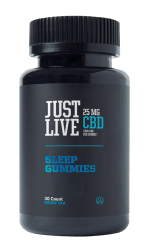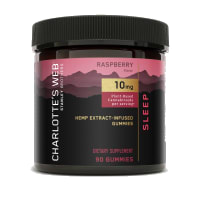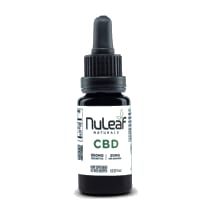The CBD craze continues to grow, we’ve seen a lot of products hit the shelves that promise better sleep. CBD has proven itself for many kinds of treatments—it can be effective at treating anxiety, depression and even help manage chronic pain. But how well does it help with sleep? Moreover, how do you choose the right products to help combat your insomnia?
It’s estimated that about a third of Americans suffer from some type of sleep disorder. With numbers like that, it’s easy to see why products aimed at alleviating insomnia are so popular. Getting adequate sleep is absolutely crucial for a high quality of life. It affects everything from your physical and mental health to how well you perform in work, school, and personal relationships. Good sleep is the bedrock from which all other aspects of your life grow.
For those not in the know, CBD—short for cannabidiol—is derived from the marijuana plant. Its prevalence is eclipsed only by THC, which is the psychoactive chemical in marijuana that gets you high. In fact, when cannabidiol is isolated, it causes absolutely no psychoactive effects and has no indication of abuse or dependence potential. To date, there are no reports or evidence of problems from using or consuming CBD.
So we know that CBD is safe to use, and it can potentially help with many issues, but just how well does it treat sleep?
The Science Behind CBD
Unfortunately, because of various legal hurdles, the scientific community hasn’t had the opportunity to test CBD as rigorously as some other alternatives. And while CBD does show promising results, much of the evidence lies in pain management, anxiety, and epilepsy.
That said, there’s a 2017 study in Current Psychiatry Reports that suggests CBD could help treat REM sleep behavior disorder, excessive daytime sleepiness, and even sleep apnea. Another study published in The Permanente Journal in 2019 tested the effect of CBD in 72 adults with anxiety and trouble sleeping. The study showed that CBD seemed to benefit both problems, but it was more effective as an anxiety treatment.
Regardless of the lack of hard scientific proof (to date) for CBD’s effectiveness in treating sleep disorders, there are two key takeaways here. One, CBD is almost certainly effective in treating anxiety, and anxiety can most definitely be a precursor for bad or inconsistent sleep. Two, CBD is extremely safe to take. With these two things in mind, it’s easy to see what CBD can certainly be effective in helping someone manage their sleep or lack thereof.
Properly Dosing
If you’re looking at trying one of the many CBD sleep products, the big question is dosing. Exactly how much should you take to see positive effects with sleep?
CBD is interesting in that, in small doses, it can promote wakefulness and alertness. It’s certainly not a powerful stimulant by any means, but to experience the more relaxing and sedative effects of CBD, you need to up the dosage.
Of course, how it’s imbibed has an effect too. In oral forms of CBD, including capsules, gummies and edibles, the effects could take 30 minutes or longer to take hold. For quicker effects, you can take oils or tinctures under the tongue.
Either way, it’s best to start off on the lower end and gradually increase your dosage until you find what works best with your chemistry. As with any natural chemical, you can’t tell exactly how your body will react, so it’s best to err on the side of caution.
The Best CBD Products for Sleep
You want to keep an eye out for a few things when choosing a CBD product for sleep. The first is to determine whether the product has a Certificate of Analysis. This indicates how much actual CBD is in the product. It’ll also let you know whether or not there are any other substances in it, like THC, for example, and what quantity.
Another good idea is to look for products that have been tested by a third party. If the product has a QR code on it, you can scan it with your smartphone to get the numbers for that particular batch.
Generally speaking, there are three types of CBD products on the market: Full-spectrum, broad-spectrum, and isolates.
- Full-spectrum CBD contains all of the naturally occurring components of the hemp plant, including trace amounts of THC and terpenes
- Broad-spectrum CBD includes nearly the same components as full-spectrum, but the THC has been removed
- Isolates are pure CBD that’s been chemically separated from the rest of the plant’s components
While there’s more testing needed, the general consensus is that full- or broad-spectrum products offer the best effects at treating sleep. It’s thought that the chemicals work better together—the entourage effect. But again, it’s best to experiment to see how your body responds to each one individually.
A Few Good Options
As stated, the products you choose should have a Certificate of Analysis. It’s also best to go with products that are sourced from U.S.-grown hemp, are produced in compliance with the FDA’s standards, and are certified organic.
Also mentioned above, dosing for sleep is going to need to be on the higher end. A treatment of 10 mg alone is likely not going to give you much benefit. But again, tread carefully, and talk to your doctor before starting any new medication. With that said, here are some of the products we’ve tested that work quite well.
Just Live Berry Tea Sleep CBD Gummies

Just Live makes a tasty CBD gummy that is completely organic, made in the U.S., and tastes pretty good too. These gummies include melatonin, 5-HTP, and GABA, offering a full arsenal of sleep aids along with 25 mg of CBD.
Charlotte’s Web Hemp Infused Gummies

The products from Charlotte’s Web get pretty good reviews. Based out of Colorado, this company produces an infused gummy containing 10 mg of CBD and 3 mg of melatonin. For those that have used melatonin in the past with limited success, this product could prove a potent combination of the hormone and CBD.

